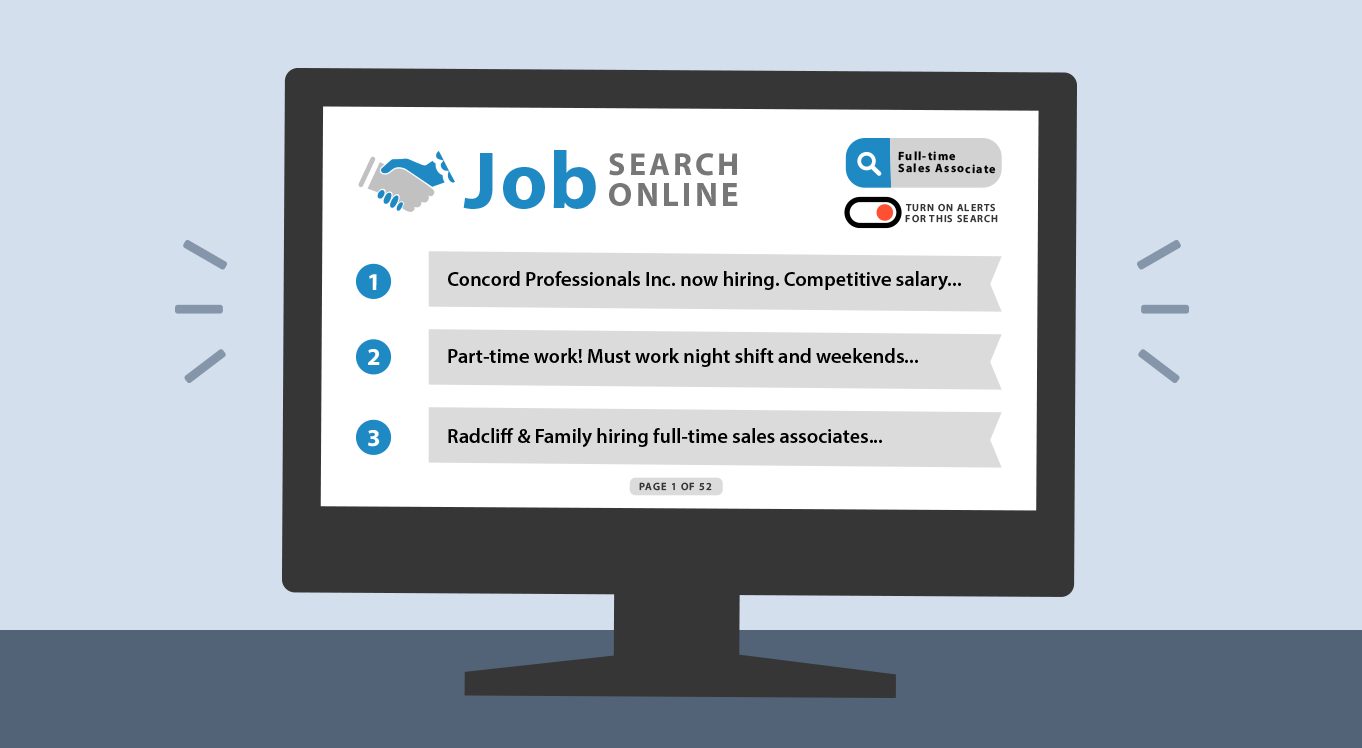Job Search and Networking -
Job Search Savvy

Job Search and Networking
Job Search Savvy



When you're looking for your very first job, a different position in your field, or planning to switch to a new career, searching for a job can be a big challenge. While there's no easy way to find a job, the right combination of job search strategies can make the process more manageable.
In this tutorial, you'll learn about adopting the right mindset and using different methods for your job search. We'll also talk about how to stay motivated, follow up, and keep organized as you begin looking for a job.
There is no question that finding a job can be difficult, especially as the global economy continues to change. While it's helpful to stay informed, it's also important that you don't become discouraged.
Remember that the more jobs you apply for, the more likely it is that you'll get hired. Maintaining a positive attitude will help you to keep pushing forward and continue to pursue job opportunities, even when the job search is stressful.
Watch the video below to learn about having a healthy job search mindset.
Click the arrows in the slideshow below to learn about adopting the right mindset when job hunting.
Check out the following resources for additional information on job hunting and career planning...
For additional help with researching and planning a career, check out our Career Planning tutorial.

There is no single path to finding a new job. Relying on just one approach as you begin your job search will limit the kind of opportunities you can discover, so you will need to use several different search methods.
For example, many people believe that job hunting is simply a process of finding and responding to job postings. And while it's becoming easier than ever to search for jobs online, it's commonly estimated that as much as 80 percent of available positions are never even advertised. Networking with different people can allow you to find opportunities in this hidden job market.
The way you conduct your job search, such as the job boards you visit, how you network, and where you go to uncover opportunities, will largely depend on your needs. It's a good idea to vary your methods in order to be as effective as possible.
Take a look at the scenario below to learn about the importance of varying your job search methods...
After graduating from a two-year training program, Ruth began searching for a new position as a medical sonographer. She applied to several online job postings that sounded promising, but when she didn't hear anything about her applications, it was difficult not to become a little frustrated.
Rather than give up on her job search, Ruth decided to refocus and diversify her search strategies. She found a retail job at a store nearby so that she could bring in money while searching for the job she had trained for.
While working, she began volunteering for a few hours each week at a local free clinic to build experience and meet people working in the field. She started to build a network with other people in the medical community, reaching out to her old classmates and new friends she met at the clinic.
While she still kept a careful watch on several online job boards, Ruth also worked to make direct contact with offices that were hiring, often by delivering her resume in person.
After several months of hard work, a friend at the clinic told her about a job opening at a small practice across town. She stopped by the office to introduce herself, which impressed its staff.
Based on the strength of her friend's recommendation and her volunteer experience at the clinic, the office was only too happy to offer Ruth a full-time position. By varying her methods and using a variety of job search strategies, Ruth's efforts finally paid off.
As we have seen with Ruth, it's crucial to use a number of techniques when searching for a job. While the Internet can be a very valuable tool for finding job postings, you should also dedicate just as much time to making connections offline and following opportunities as they arise.
Looking for a job takes a great deal of time, energy, and effort. Below are different things you will need to begin your job search...
Go to our Resume Writing and Cover Letters tutorials to get help with preparing your paperwork.

Once you've started looking for a job, there are different strategies that can make your search more effective. Review the techniques below to learn more about getting the most out of your job search.
Searching for a job can be a difficult and lengthy process. Even after you've adopted the right mindset and started using a variety of job search strategies, it can be difficult to stay motivated if your search isn't going as well as you had hoped.
Try your best to stay positive and set goals for your job-hunting activities. Goals can help you measure your progress and add structure to your job search.
You might also consider creating a support network of friends and family members who are also looking for new opportunities. You'll be able to share your experiences and help encourage one another to keep searching.
Watch this video to learn more about staying motivated when conducting a job search...
Another common quality among successful job seekers is a willingness to follow up. Just making a connection or submitting your resume is simply not enough to help you stand out among other possible candidates.
Following up will give you the opportunity to show your interest, assert your qualifications, and establish a positive relationship with the person who may ultimately hire you.
While it's important not to be overly aggressive in pursuing opportunities, following up in a timely, professional, and courteous manner will simply underscore your interest in the position, making a positive impression on your potential employer.
After you've started your job search, you'll understand how important it will be to develop a way to keep everything organized. Imagine how embarrassing it might be to receive a call from a hiring manager and not remember who he is or how you met.
You might consider creating a job search log, where you can document your job search, make a list of potential connections, and keep track of the jobs you have applied for.
Check out some of the different resources below that can help you stay organized during your job search:
/en/jobsearchandnetworking/find-a-job-online/content/